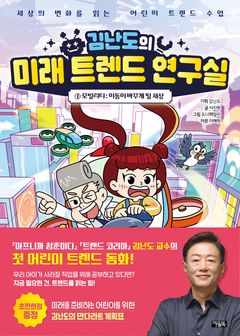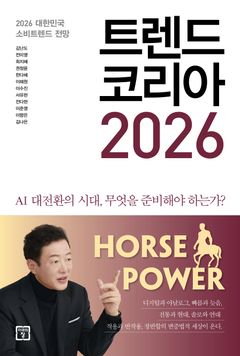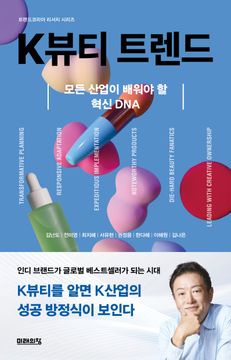2025 K-Consumer Trend Insights
2024년 10월 25일 출간
국내도서 : 2024년 10월 30일 출간
- eBook 상품 정보
- 파일 정보 ePUB (18.66MB)
- ISBN 9788959897261
- 지원기기 교보eBook App, PC e서재, 리더기, 웹뷰어
-
교보eBook App
듣기(TTS) 가능
TTS 란?텍스트를 음성으로 읽어주는 기술입니다.
- 전자책의 편집 상태에 따라 본문의 흐름과 다르게 텍스트를 읽을 수 있습니다.
- 이미지 형태로 제작된 전자책 (예 : ZIP 파일)은 TTS 기능을 지원하지 않습니다.

쿠폰적용가 11,970원
10% 할인 | 5%P 적립이 상품은 배송되지 않는 디지털 상품이며,
교보eBook앱이나 웹뷰어에서 바로 이용가능합니다.
카드&결제 혜택
- 5만원 이상 구매 시 추가 2,000P
- 3만원 이상 구매 시, 등급별 2~4% 추가 최대 416P
- 리뷰 작성 시, e교환권 추가 최대 200원
작품소개
이 상품이 속한 분야
역대급 무더위가 대한민국을 강타한 2024년 여름, 지구는 역사상 가장 뜨거운 날의 기록을 연달아 경신했다. 지금 우리는 ‘역대급’이라는 말 자체가 역대급으로 많이 쓰이는 시대를 살고 있다. 그만큼 우리 사회의 역동성이 크다는 뜻이기도 하다. 근 20년 동안 우리 사회의 추이와 소비 활동의 여러 모습을 추적, 관찰해온 트렌드 코리아 팀은 대한민국이 그 어느 때보다도 더 특유의 역동성과 역량을 바탕으로 전에 없는 다양성을 표출하는 모습을 목격하고 이를 책에 담고자 했다. 대한민국은 열풍의 나라이기도 하다. 해외 토픽을 장식한 푸바오 열풍, 마라탕과 탕후루에 이은 두바이 초콜릿 열풍, AI 열풍, 의대 열풍, 스페셜티 커피 열풍, 레트로 열풍, 남녀노소를 가리지 않는 ‘먼작귀’ 열풍까지…. 이 모든 것이 시사하는 바는 무엇인가? 이런 열풍의 이면에 있는 우리 사회 구성원들의 욕망과 결핍은 무엇일까? 《트렌드 코리아 2025》에서 이에 대한 답을 찾아보도록 하자.
Ten Keywords
Savoring a Bit of Everything: Omnivores 17
Nothing Out of the Ordinary: Very Ordinary Day 41
All About the Toppings 61
Keeping it Human: Face Tech 83
Embracing Harmlessness 105
Shifting Gradation of Korean Culture 125
Experiencing the Physical: the Appeal of Materiality 153
Need for Climate Sensitivity 175
Strategy of Coevolution 199
Everyone Has Their Own Strengths: One-Point-Up 219
Authors 242
The overlapping of life cycles is also straining household finances. In the past, old age was seen as a time when children would support their parents, but now many seniors find themselves financially supporting both their children and parents, even after reaching 65, the socially recognized “elderly age.” According to Statistics Korea’s Survey on the Status of the Elderly, only 0.9% of people aged 65 and older reported regularly providing financial support to their children in 2011. - p. 22
The most defining characteristic of Korean consumer culture is its preoccupation with others’ perceptions. This concern often drives individuals to purchase branded products, even at a higher cost, with a strong preference for luxury goods as the most extreme example. As noted earlier, there’s a tendency to compare and flaunt happiness, but under the #VOD trend, the focus is shifting inward and away from showing off to others. - p. 48
Additional decorations or options added to a basic product are often referred to as “toppings.” Pizza is the prime example - various toppings are added to a simple dough base to create the perfect flavor for each individual. While customers may have not felt so strongly about toppings in the past, they are now central to crafting one’s personal favorite item. In recognition of this shift, 2025 K-Consumer Trend Insights has coined the term “toppings economy” to describe how these secondary elements are gaining more attention and having a new economic impact. Toppings, which allow consumers to use products in flexible, personalized ways, are now crucial for enhancing customer satisfaction. - p. 63
In the age of generative AI, companies and products that engage with users in a ‘human-like’ manner, understanding and responding to emotions, will stand out. Amidst a competitive landscape brimming with new technologies, Face tech offers a significant edge by bringing technology closer to human interaction. - p. 83
The concept of harmlessness presents a paradox. While it suggests the absence of harm and implies minimal influence on others, it also embodies a certain power that can affect those around it. How can something deemed harmless possess such power? Harmlessness can be broken down into four elements: smallness, cuteness, innocence, and clumsiness. The ultimate embodiment of all these elements of harmlessness is a baby. Babies are small, cute, innocent, and often clumsy, disarming us completely when we encounter them. - p. 116
Imagine being asked this question alongside four job cards showing an Indian painter, an Asian chef, a Latino doctor, and a European farmer. How would you answer? The correct response is, “I don’t know.” This question is actually used as a teaching tool in multicultural education for elementary students. The approach to multicultural education has evolved, moving beyond simply acknowledging differences in appearance, to teaching that nationality should not be determined by looks at all. We are entering an era where being Korean cannot be defined by race alone - a phenomenon that can be termed “people gradation,” reflecting the shifting concept of the Korean people. - pp. - 129
Even Korean security capabilities are being exported. In September 2024, Guatemala opened a “Police Job Training Center” to learn from Korean expertise. The transfer of skills includes cyber investigation, forensic science investigation techniques, and Korea’s 112 emergency reporting system - a phenomenon some call the “Korean wave of security.” - p. 134
Today’s audiences aren’t content with just watching a movie - they want to touch, own, and experience the story. To meet these demands, the trend is to transfer the narrative from the screen to the real world. While goods and photo zones are standard, the key is to create experiences that make the movie’s world come alive. In today’s market, content must leap off the screen and into the audience’s hands to truly captivate and draw them in. - pp. 155
Rising temperatures are only part of the problem. Recent climate change is fundamentally altering the way we live and, perhaps most critically, is directly impacting the global economy. The yields of key crops like coffee, sugar, and cocoa have plummeted, leading to skyrocketing prices and the coining of the term “climate inflation.” In the restaurant industry, it’s becoming increasingly common for certain menu items to disappear due to the unstable supply of raw ingredients caused by sudden heavy rains. - p. 178
A natural ecosystem consists of a community of living organisms interacting with their environment, while a business ecosystem represents a market economy environment where multiple companies compete, cooperate, and converge. Much like in a biological ecosystem, participants in a business ecosystem must coevolve, depending on - yet competing with - each other for survival. This process ultimately creates a coevolutionary ecosystem that drives innovation in customer value. - pp. 203
Most members of Trenders Day are high-performing professionals, yet their primary worry revolves around career management and development. This isn’t merely about job performance, the desire to quit, or workplace difficulties. The crux of their concerns is a strong desire for self-improvement. - p.221
인물정보

Rando Kim is a professor in the Dept. of Consumer Science (DCS), Seoul National University (SNU). As a specialist in consumer behavior and market trend analysis, he has written more than 20 books including the Trend Korea series, Dining Business Trend series, Market Kurly Insight , The Hyundai Seoul Insight , Trend China, What Consumers Want, and Luxury Korea . He also wrote essay books, Amor Fati , Future and My Job , and Youth , It’s Painful which have sold three million copies in 17 countries. He has conducted research projects about consumer needs finding, new product planning, and market trend probing for Korea’s major companies like Samsung, LG, SK, CJ, Hyundai Motors, GS, LH, Amorepacific, Lotte, Fursys, Nongshim, and Coway.

Miyoung Jeon is a research fellow at the Consumer Trend Center (CTC) under Seoul National University. She holds BA, MA and PhD degrees in Consumer Science. Since 2009, she has co-authored numerous books including the annually published and top-ranked book series Trend Korea, as well as Trend China , Dining Business Trend series, and Breakthrough Power . Miyoung worked as a research analyst at Samsung Economic Research Institute, served as a research professor at SNU, and is currently a columnist for Dong-A Ilbo’s ‘Trend Now’ section. Additionally, she holds positions as the chair for Lotte Shopping’s ESG Committee and serves as an advisor for multiple organizations including LG U+, Hana Bank and the Seoul Metropolitan Government. Currently, she collaborates with various companies, focusing on new trend-based product development and strategic planning.
Jihye Choi, PhD in Consumer Science from DCS, SNU, works as a research fellow at CTC. She has participated in many consulting projects with Korea’s leading companies such as Samsung and LG, and gives public lectures on consumer trends. She currently teaches consumer behavior and qualitative research methodology at SNU. She contributes many articles and columns to major Korean newspapers and media.
Jung Yoon Kwon currently works as a research fellow at CTC, SNU. She obtained her BA, MA, and PhD degrees in Consumer Science, SNU. She explored the intergenerational transmission of consumption styles in her PhD dissertation. She has participated in many consulting projects with leading Korean companies such as Samsung and CJ, and she also teaches an Introduction to Consumer Science course at Sung Kyun Wan University.
Dahye Han currently works as a research fellow at CTC, SNU. She received a BA in Psychology, SNU and obtained MA and PhD degrees in Consumer Science, SNU. Her PhD dissertation focused on the structure and measurement of consumption emotions. As a researcher, she received a paper award from the Korean Consumption Culture Association in 2022. Also, she is conducting a number of consulting projects with major Korean companies, such as Samsung and LG.
Hyewon Lee is a PhD in Consumer Science, SNU and is currently a senior researcher at CTC. She is interested in generation theory and changes in consumer behavior due to technological advances, based on insights gained while working at the Korea Publishing Culture Association, Dasan Books, Reader’s Book, and Kakao Page. Recently, she has been conducting research on expanded cultural capital to explore the drivers of consumption trends that cannot be explained by economic capital.
June Young Lee currently works as a professor at Sangmyung University. He received a doctorate degree in Consumer Science, SNU. He received ‘The Best Paper Award’ in the International Journal of Consumer Studies . He worked as a senior researcher at Life Soft Research lab at LG Electronics. He is a laboratory chief at the Consumer Research Center in Sangmyung University.
Hyang Eun Lee is an Executive Director at LG Electronics Home Appliance & Air Solution [H&A] Business Division. She holds a Master’s degree from Central Saint Martins in the UK and a Ph.D. in Design from Seoul National University.
At LG Electronics, she is responsible for product planning focused on customer experience [CX] innovation. Her work includes launching innovative products, discovering and managing new business models, establishing CX-based management strategies, and designing product and space services. As a professor in the Department of Service·Design Engineering at Sungshin Women’s University, she has conducted numerous corporate customer experience projects, bridging academia and industry. She is also actively engaged in research, publishing papers in top 25% [Q1] SSCI and SCIE international journals. As an expert bridging theory and practice, she has been writing a column titled “Lee Hyang-eun’s Trend Touch” for the JoongAng Ilbo since 2021.
Yelin Chu received an MA degree in Consumer Science, SNU. Currently, she is attending a PhD program and serves as a senior researcher at CTC. Her Master’s thesis was entitled “A Study of Consumer Experience on the Online Education Service with Conditional Tuition Refund.” She is interested in analyzing big data to distill insights from unstructured data, and in deriving further meaning from participant interviews through qualitative research.
Dahyen Jeon is currently working on her PhD and is a senior researcher at CTC. She received a BA degree in Fashion Industry at Ewha Womans University and an MA degree in Consumer Science at SNU. She was awarded first place in the Korean Society of Clothing and Textiles (KSCT) contest in 2019. Her area of interest is consumer behavior in the digital retail environment. Her current research focuses on online visual cues and haptic imagery.
이 상품의 총서
Klover리뷰 (0)
- - e교환권은 적립일로부터 180일 동안 사용 가능합니다.
- - 리워드는 5,000원 이상 eBook, 오디오북, 동영상에 한해 다운로드 완료 후 리뷰 작성 시 익일 제공됩니다. (2024년 9월 30일부터 적용)
- - 리워드는 한 상품에 최초 1회만 제공됩니다.
- - sam 이용권 구매 상품 / 선물받은 eBook은 리워드 대상에서 제외됩니다.
- 도서나 타인에 대해 근거 없이 비방을 하거나 타인의 명예를 훼손할 수 있는 리뷰
- 도서와 무관한 내용의 리뷰
- 인신공격이나 욕설, 비속어, 혐오 발언이 개재된 리뷰
- 의성어나 의태어 등 내용의 의미가 없는 리뷰
구매 후 리뷰 작성 시, e교환권 100원 적립
문장수집
- 구매 후 90일 이내에 문장 수집 등록 시 e교환권 100원을 적립해 드립니다.
- e교환권은 적립일로부터 180일 동안 사용 가능합니다.
- 리워드는 5,000원 이상 eBook에 한해 다운로드 완료 후 문장수집 등록 시 제공됩니다. (2024년 9월 30일부터 적용)
- 리워드는 한 상품에 최초 1회만 제공됩니다.
- sam 이용권 구매 상품 / 선물받은 eBook / 오디오북·동영상 상품/주문취소/환불 시 리워드 대상에서 제외됩니다.
구매 후 문장수집 작성 시, e교환권 100원 적립
신규가입 혜택 지급이 완료 되었습니다.
바로 사용 가능한 교보e캐시 1,000원 (유효기간 7일)
지금 바로 교보eBook의 다양한 콘텐츠를 이용해 보세요!

- 구매 후 90일 이내 작성 시, e교환권 100원 (최초1회)
- 리워드 제외 상품 : 마이 > 라이브러리 > Klover리뷰 > 리워드 안내 참고
- 콘텐츠 다운로드 또는 바로보기 완료 후 리뷰 작성 시 익일 제공
가장 와 닿는 하나의 키워드를 선택해주세요.
총 5MB 이하로 jpg,jpeg,png 파일만 업로드 가능합니다.
신고 사유를 선택해주세요.
신고 내용은 이용약관 및 정책에 의해 처리됩니다.
허위 신고일 경우, 신고자의 서비스 활동이 제한될 수
있으니 유의하시어 신중하게 신고해주세요.
이 글을 작성한 작성자의 모든 글은 블라인드 처리 됩니다.
구매 후 90일 이내 작성 시, e교환권 100원 적립
eBook 문장수집은 웹에서 직접 타이핑 가능하나, 모바일 앱에서 도서를 열람하여 문장을 드래그하시면 직접 타이핑 하실 필요 없이 보다 편하게 남길 수 있습니다.
차감하실 sam이용권을 선택하세요.
차감하실 sam이용권을 선택하세요.
선물하실 sam이용권을 선택하세요.
-
보유 권수 / 선물할 권수0권 / 1권
-
받는사람 이름받는사람 휴대전화
- 구매한 이용권의 대한 잔여권수를 선물할 수 있습니다.
- 열람권은 1인당 1권씩 선물 가능합니다.
- 선물한 열람권이 ‘미등록’ 상태일 경우에만 ‘열람권 선물내역’화면에서 선물취소 가능합니다.
- 선물한 열람권의 등록유효기간은 14일 입니다.
(상대방이 기한내에 등록하지 않을 경우 소멸됩니다.) - 무제한 이용권일 경우 열람권 선물이 불가합니다.
첫 구매 시 교보e캐시 지급해 드립니다.

- 첫 구매 후 3일 이내 다운로드 시 익일 자동 지급
- 한 ID당 최초 1회 지급 / sam 이용권 제외
- 구글바이액션을 통해 교보eBook 구매 이력이 없는 회원 대상
- 교보e캐시 1,000원 지급 (유효기간 지급일로부터 7일)



















